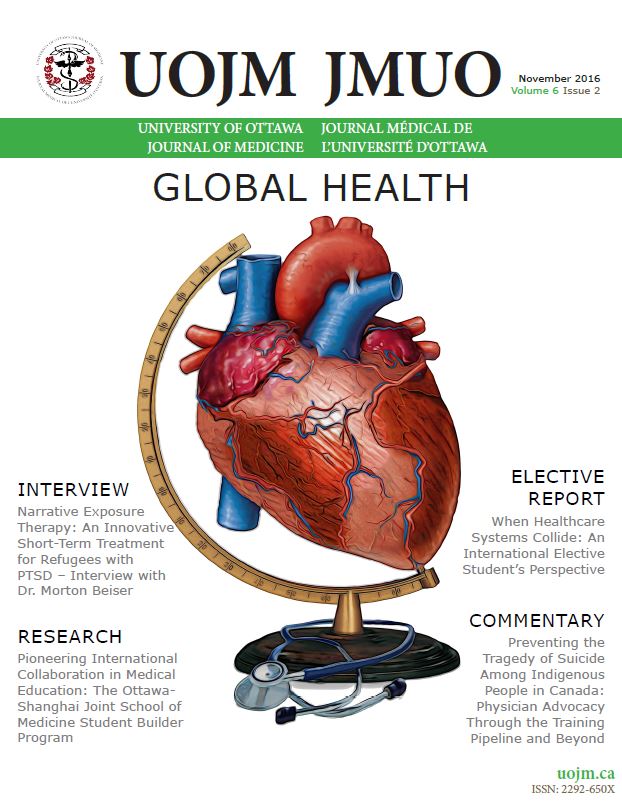Narrative Exposure Therapy: An Innovative Short-Term Treatment for Refugees with PTSD – Interview with Dr. Morton Beiser
DOI :
https://doi.org/10.18192/uojm.v6i2.1760Mots-clés :
Narrative Exposure Therapy, RefugeesRésumé
ABSTRACT
Dr. Morton Beiser is a Professor of Distinction in Psychology at Ryerson University, as well as Founding Director and Senior Scientist at the Centre of Excellence for Research on Immigration and Settlement (CERIS) in Toronto. After obtaining his medical degree from the University of British Columbia in 1960, he interned at the Montreal General Hospital, completed residency in Psychiatry at Duke University Medical Centre and pursued post-doctoral training in Psychiatric Epidemiology at Cornell University. Dr. Beiser was appointed as Associate Professor of Behavioural Sciences at the Harvard School of Public Health from 1967 to 1975, before returning to Toronto to assume a David Crombie Professorship of Cultural Pluralism and Health, and professorship in Psychiatry. Given his extensive research experience on immigration and resettlement work, we interviewed Dr. Beiser to gain further insight into how Narrative Exposure Therapy (NET) can be an innovative short-term option to treat refugee patients with post-traumatic stress disorder (PSTD). Dr. Beiser is currently conducting a randomized trial to assess the effectiveness of NET among refugee children and youth in Toronto.
RÉSUMÉ
Dr Morton Beiser est un professeur distingué en psychologie à l’Université Ryerson, ainsi que directeur fondateur et scientifique principal au Centre d’excellence pour la recherche en immigration et en intégration (CEREI) de Toronto. Après avoir obtenu son doctorat en médecine à l’Université de la Colombie-Britannique en 1960, il a fait son internat à l’Hôpital général de Montréal, a complété sa résidence en psychiatrie au centre médical de l’Université Duke et a suivi une formation postdoctorale en épidémiologie psychiatrique à l’Université Cornell. Dr Beiser a été nommé professeur agrégé en sciences du comportement à l’École de santé publique de Harvard de 1967 à 1975, avant de retourner à Toronto pour occuper la Chaire David Crombie sur le pluralisme culturel et la santé, et la chaire de psychiatrie. Compte tenu de sa vaste expérience en recherche sur l’immigration et la réinstallation, nous avons interviewé Dr Beiser pour mieux comprendre comment la thérapie d’exposition descriptive (TED) est une option novatrice à court terme pour traiter les patients réfugiés atteints de trouble de stress post-traumatique. À l’heure actuelle, Dr Beiser mène un essai randomisé pour évaluer l’efficacité de TED chez les enfants et jeunes réfugiés de Toronto.
Références
2. Beiser M. Strangers at the Gate: the “Boat People’s” First Ten Years in Cana¬da. Toronto, ON: University of Toronto Press, 1999. 214p.
3. Beiser M, Cargo M, Woodbury MA. A comparison of psychiatric disorder in different cultures: depressive typologies in Southeast Asian refugees and residential Canadians. International Journal of Methods in Psychiatric Re¬search. 1994;4: 157–72.
4. Beiser M, Flemming JAE. Measuring psychiatric disorder among Southeast Asian refugees. Psychological Medicine. 1986;16(3): 627–39.
5. Beiser M, Hou F. Language acquisition, unemployment and depressive dis¬order among Southeast Asian refugees: a 10-year study. Social Science and Medicine. 2001;53(10):1321-34.
6. Beiser M, Johnson PJ, Turner RJ. Unemployment, underemployment and depressive affect among Southeast Asian refugees. Psychological Medicine. 1993;23(3): 731–43.
7. Neuner F, Schauer M, Klaschik C, Karunakara U, Elbert T. A comparison of narrative exposure therapy, supportive counseling and psychoeducation for treating posttraumatic stress disorder in an African refugee settlement. Journal of Consulting and Clinical Psychology. 2004; 72(4): 579–587.
8. Schauer M, Neuner F, Elbert T. Narrative exposure therapy - A short-term treatment for traumatic stress disorder. Cambridge, MA: Hogrefe Publish¬ing, 2011. 112p.
9. Robjant K, Fazel M. The emerging evidence for narrative exposure therapy: A review. Clinical Psychology Review. 2010; 30(8): 1030–1039.
10. Schaal S, Elbert T, Neuner F. Narrative exposure therapy versus interpersonal psychotherapy. Psychotherapy and Psychosomatics. 2009; 78(5): 298–306.
11. Ruf M, Schauer M, Neuner F, Catani C, Schauer E, Elbert T. Narrative ex¬posure therapy for 7 to 16-year olds: A randomized controlled trial with traumatized refugee children. Journal of Traumatic Stress. 2010; 23(4): 437–445.
Téléchargements
Publié-e
Numéro
Rubrique
Licence
- Les auteurs qui publient dans le JMUO gardent les droits d’auteur de leurs articles, incluant tous les brouillons et la copie finale publiée dans le journal
- Bien que le JMUO n’a pas les droits d’auteur des articles soumis, en acceptant de publier dans le JMUO, les auteurs donnent le droit au journal d’être les premiers à publier et à distribuer leurs articles.
- Par la suite, les auteurs peuvent soumettre leurs documents à d’autres publications, incluant des revues ou des livres, avec un remerciement de leur première publication dans le JMUO
- Des copies du JMUO seront distribuées à la fois sous format papier et en ligne, et tous les matériaux seront accessibles au public en ligne. Le journal n’a pas de responsabilité légale par rapport à la distribution publique du contenu.
- Prière de vous assurer que tous les auteurs, les coauteurs et les investigateurs
- Le contenu est rendu disponible sous licence Creative Commons Attribution - Pas d'Utilisation Commerciale - Pas de Modification 4.0 International.


